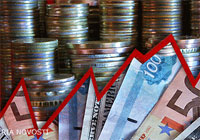Putin’s Russia Will Prosper Until It Doesn’t

(Bloomberg editorial – bloomberg.com – January 30, 2014) The recurrent turmoil in emerging markets raises a difficult question about Russia: Is it a fundamentally sound economy that can weather the storm, or a corrupt autocracy headed for disaster?
Unsatisfying as it may be, the answer is both.
As the U.S. Federal Reserve starts to pull back on its extraordinary stimulus efforts, global investors are reassessing the attractiveness of emerging markets everywhere. Countries that show visible weaknesses, such as Turkey (with its heavy reliance on foreign credit) or Argentina (with its overvalued currency), have been the hardest hit.
Russia’s fiscal and financial position, by contrast, would be the envy of many a developed nation. Thanks in large part to energy exports, the country earns more than it invests and spends at home, so it doesn’t need foreign borrowing to make ends meet. The government’s gross debt amounts to only 14 percent of annual economic output, and it has socked away almost $90 billion in a rainy-day fund to insure against a drop in oil prices. The recent decline in the ruble, down about 5 percent against the dollar since Jan. 1, could actually be beneficial, boosting the profit margins of exporters and helping local producers compete with imported goods.
So what’s not to like? It’s the extent to which Russia’s economic management depends on President Vladimir Putin, whose grip on power is proving increasingly costly in both monetary and humanitarian terms. Consider the roughly $50 billion price of the Sochi Winter Olympics, much of which will go to Putin’s close allies, or the draconian limits on freedom of speech and assembly that have helped Putin suppress a largely middle-class protest movement.
Fair competition and the rule of law, so crucial for economic development, cannot survive in a country where the leader’s power depends on his ability to choose winners in business and jail whomever he wants. Entrepreneurs are left with little incentive to build something that they know can be taken away. Not surprisingly, the number of active individual entrepreneurs in Russia has declined 14 percent over the past two years.
The result is an economy dominated by giant, slow-growing, state-controlled companies, and a government dependent on oil and gas revenue to maintain the level of spending needed to keep soldiers, state workers and pensioners mollified. Russia’s economy is expected to expand at an inflation-adjusted rate of only about 2 percent this year, compared with an average of almost 7 percent in the decade preceding the financial crisis. The consulting company Macro Advisory estimates that the government will require an oil price of more than $108 a barrel to balance its budget over the next few years.
This is not a recipe for long-term stability. If a sustained drop in energy prices depleted Russia’s rainy-day fund and forced the government into austerity, the protest movement could turn into something more virulent. Given the Kremlin’s tight control of the electoral system, the only route to a transfer of power would be revolution, which in turn could install a leader even less palatable than Putin.
Politics have economic consequences, and vice versa. If the broader turmoil in emerging markets causes investors and Russia’s leaders to pay heed, it will have done them a service.
Article ©2014 Bloomberg L.P. All Rights Reserved. Article also appeared at http://www.bloomberg.com/news/2014-01-30/putin-s-russia-will-prosper-until-it-doesn-t.html
